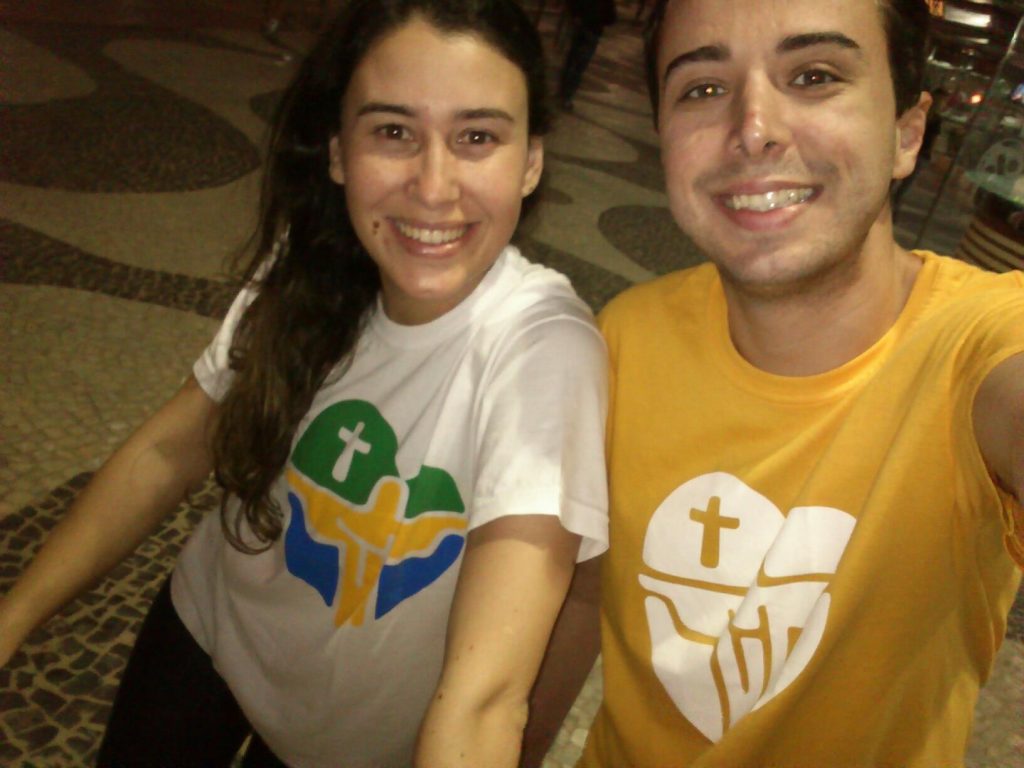By Christopher White, The Tablet’s National Correspondent

PANAMA CITY, Panama – In the minds of international pilgrims from across the globe, Gustavo Huguenin and Fabíola Goulart are lovingly thought of as “World Youth Day’s most famous couple.”
The pair first met during the planning stages of the 2013 World Youth Day in their homeland of Brazil. They spent their first year of marriage living in Krakow, Poland, volunteering for the 2016 gathering, and are now back in Panama for the pope’s 3rd visit to what is widely considered one of the biggest youth festivals in the world.
In an interview with The Tablet, Fabíola, a Catholic journalist, and Gustavo, a graphic designer, described how “every step of our relationship has been connected to World Youth Day.”
Originally from Florianópolis, in the south of Brazil, Fabíola met Gustavo when she moved to Rio to work in the communications office for the 2013 World Youth Day. Gustavo was an early member of the organizing committee for the event and the winner of the logo design competition.
In addition to working as long-term volunteers, they were also both members of the Catholic Charismatic Renewal movement.
While the two were immediately attracted to each other, they knew that World Youth Day planning is enough of a chaotic environment without the added distraction of a burgeoning relationship, so they put things on hold.
But soon after the pope had left Brazil – forever changing the expectations for papal travel with his blockbuster press conference on the way back to Rome – they began long distance dating.
Fabíola’s homeland was 960 miles away from Gustavo in Rio – or as she describes it, “as far away as Italy is to Portugal” – which, naturally, complicated things.
But, as Gustavo playfully added: “if we survived working a World Youth Day, we can survive anything in a marriage!”
Just over a year later, they were back on the shores of Cococabana Beach, where Pope Francis closed out World Youth Day drawing a crowd of over 3 million pilgrims for his final Mass, when Gustavo proposed to Fabíola.
As they began the wedding planning process – including the complications of whom to invite, what to wear, and how to celebrate – the couple faced the difficult decision of where to live.
Three months before the wedding, they’d still been unable to reach a decision when a fellow World Youth Day volunteer, now in Krakow, suggested they spend a year in preparation for the July 2016 World Youth Day. Although the idea seemed wild, it also – in a very strange way – made the most sense. World Youth Day was what originally brought them together, so why not spend the first year of their lives together preparing for the next one?
“I would have people ask, ‘What’s your address? I want to send you a television’ or some other wedding present,” Fabiola recalls, only having to say that they actually didn’t have an address.
As bizarre or countercultural as it seemed to many of their friends and family, for Fabíola and Gustavo, that was precisely the point: World Youth Day is all about not being afraid to be countercultural.
Gustavo remembers thinking, “Maybe that’s why we couldn’t decide where to live, maybe this is God’s will for us.”
One month after their wedding, the two were settled in Krakow, in what they jokingly called an “extended honeymoon.” They would go on to lead the international social media team.
Along with navigating a new country and the long days and often-disorganized process of World Youth Day planning, Gustavo and Fabíola also encountered a Church very different from that of their Latin American upbringing.
“In Poland, everything was much more formal,” said Fabíola. “But it was also very peaceful, too.”
She described a contrast between a church in the global south driven by the involvement of the laity, compared to that of Poland being more defined by its clergy.
“In Krakow, we learned there is another way of being church that is beautiful too,” she said.
In Panama they’re once more leading the social media team, overseeing operations in 22 languages.
While World Youth Days may have a somewhat standard formula, they also said each one is distinctive.
Here in Panama – where Pope Francis arrived on Wednesday – they believe they’ll experience similarities to Rio, but perhaps see a pope who’s even more free as he’s got some experience under his belt and, for the first time in his own World Youth Day history, able to speak Spanish directly to pilgrims.
While that might provide some social media challenges, as Pope Francis is likely more inclined to go off-script, they believe it adds to the authenticity of the event.
Although they just arrived in Panama in December, having settled back in the south of Brazil where they run their own agency for church communications and events, and unable to be away from home for extended periods – “We actually have a cat and a house now,” said Fabíola – they’re happy to provide support so that others might have a World Youth Day experience that changes their lives.
While they said they’re not making any commitments to be involved in the next one, they do look forward to the day that they can take their kids or even grandkids.
“Our vocations are connected to World Youth Day,” said Gustavo. “It changed my life – my address, my job, my relationship status, and my faith. It’s very important to me.”
